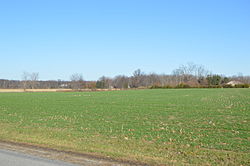Name and history
Crane Township was established in 1825, named for Oliver Crane, an early settler and community leader. [4] The first European-American settlers arrived around 1823, traveling by pirogues or dugout canoes on the Maumee River, which was the primary transportation route before roads were established.
One of the earliest settlements in the township was Cranesville, founded near the Maumee River. This community became a vital trading post and the location of the first post office, established in 1829, with Oliver Crane serving as postmaster. Horatio Nelson Curtis was another key figure in the township’s early history; he built a home that still stands today and served as Justice of the Peace. No other evidence of Cranesville remains.
Another early Crane Township settlement was New Rochester, laid out in 1835 on the south bank of the Maumee River. Thanks to its prime location, the settlement became a stop on the stagecoach line connecting Toledo to Fort Wayne. The coach route followed what is now County Road 424 (formerly U.S. Highway 24), with New Rochester serving as a relay station where fresh horses were brought in for the journey. New Rochester thrived briefly, becoming the first county seat in 1839. Today, the site is occupied by New Rochester Park, which is maintained by the Paulding County Park District. In 2025, a historical marker was installed in the park as part of the Crane Township bicentennial celebration to commemorate the town's legacy.
During the mid-19th century, transportation and industry played a critical role in the township’s development. The Wabash & Erie Canal, which passed through the township along what is now Road 180 (Canal Road), facilitated trade and travel. The township was also home to Paulding Furnace, a company town established in 1864 to support an iron smelting operation. However, after the Reservoir War of the 1887, the furnace ceased operations, and the community disappeared.
Other early settlements include Henpeck and Knoxdale. No remnants of either community remain.
The late 19th century brought the railroad era, leading to the growth of Cecil, the township’s only incorporated village. Founded in 1871, Cecil developed as a railroad hub with two major lines—the Wabash Railroad and the Cincinnati Northern Railroad—running through it.
Statewide, the only other Crane Township is located in Wyandot County. [5]
This page is based on this
Wikipedia article Text is available under the
CC BY-SA 4.0 license; additional terms may apply.
Images, videos and audio are available under their respective licenses.



